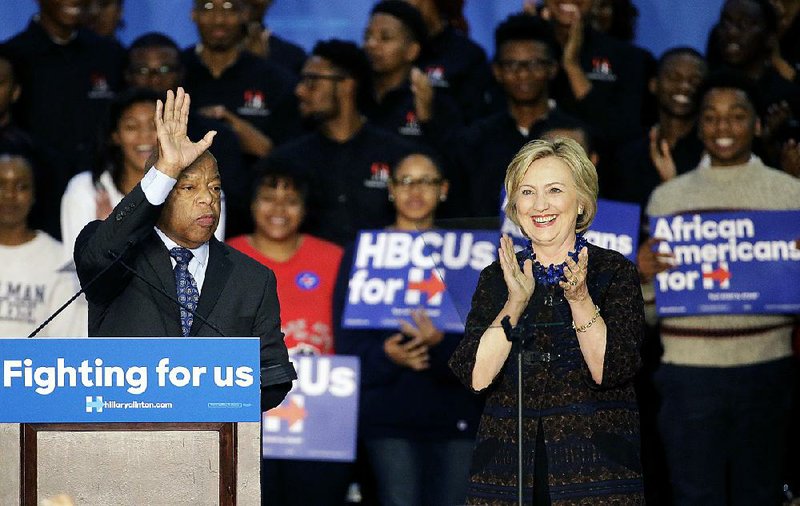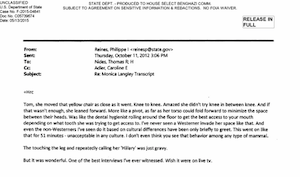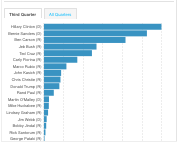WASHINGTON -- A new batch of Hillary Rodham Clinton's emails released Friday presented a glimpse into the breadth of her personal network -- a Rolodex of celebrities, chief executive officers, political advisers and politicians.
Long before she became secretary of state in 2009, Clinton and her team balanced requests from a long list of boldface names. They included the pop star Lady Gaga, Burma's pro-democracy leader Aung San Suu Kyi and former President Jimmy Carter.
While Clinton's private email address was unknown to much of official Washington, at least one Hollywood celebrity wrote to her there. Actor Ben Affleck, a longtime Clinton supporter, urged her in April 2012 to review a draft of a report about security problems in the Democratic Republic of Congo.
Hours later, Clinton emailed an aide, "I'd like to respond to Ben Affleck." A day later, she reminded an aide that she was still waiting for the aide to draft a reply: "I haven't yet received a draft and would like to respond today."
The response to Affleck was censored in the email released Friday by the State Department, because it was a draft version.
In another December 2011 note, civil-rights leader and former presidential candidate Jesse Jackson reached out to Clinton's staff with a request to talk to her before his visit to South Africa, asking how best to "represent her/Admin thinking on any issues/opportunities that might arise." He was quickly added to her call list.
On Friday, hours before the email release, Jackson touted Clinton's candidacy before a meeting of black pastors in Atlanta, saying: "It's healing time. It's hope time. It's Hillary Clinton time."
Clinton has faced questions about whether her unusual email setup, which involved a private server at her New York home, was sufficient to ensure the security of government information and retention of records.
At least two Senate committees are still investigating Clinton's email arrangement and seeking the release of correspondence from her top aides as part of an investigation into the administration's handling of the attacks on a U.S. compound in Benghazi, Libya, in 2012. The FBI also is investigating the security of Clinton's private email setup.
Yet Clinton's campaign has been steady since the first Democratic primary debate, in which fellow Democratic candidate for president, Sen. Bernie Sanders of Vermont, defused the issue by saying "the American people are sick and tired of hearing about your damn emails."
Roughly half of Clinton's 30,000 work-related emails are now public, and the State Department's effort to release the rest will linger into next year. Most of the correspondence made public to date involves the mundane workings of government -- scheduling meetings, organizing secure phone lines and booking flights.
A few of the emails hint at the ways Clinton maintained her network of campaign donors, even while serving in a position at a distance from electoral politics. In a June 2011 message, an aide informs Clinton that longtime donor Susie Buell contributed $200,000 toward an event at which Clinton was scheduled to speak.
"She wants it to be wonderful for you," wrote Clinton aide Melanne Verveer.
In April 2011, Clinton's aides received a request from Jose Villarreal, a former Clinton campaign adviser from Texas, to speak at the launch of a project she asked him to start involving U.S. engagement with Mexico. Clinton told her aides to develop a news and social media outreach "to every possible group." Villarreal now serves as her campaign's treasurer.
Other emails highlight the struggles of her daily life at the State Department -- from technological issues to sleepless nights. She requests her password for The New York Times website, searches for books and apologizes to old law school friends for being slow to reply to their emails.
In April 2011, daughter Chelsea Clinton, using the email alias Diane Reynolds, emailed her mother a link from a Wall Street Journal story headlined "The Sleepless Elite: Why Some People Can Run on Little Sleep and Get So Much Done."
Clinton forwarded it to her assistant with her common request, "Pls print."
A year later, Clinton asked her top communications aide if she could get "smiley faces" on her new BlackBerry. Philippe Reines responded, "For email, no, I don't think so - you need to type them out manually like :) for happy, or :-ll if you want to express anger at my tardiness."
He also explained how for text messaging, typing :) might "automatically convert it into a symbol. Try it."
obama correspondence
With the ongoing release of the emails, the White House is asking to block the release of a handful of emails between President Barack Obama and Clinton, his former secretary of state, citing long-standing precedent invoked by presidents of both parties to keep presidential communications confidential, officials said Friday.
The State Department discovered the emails between Obama and Clinton as part of its effort to release the former secretary's emails. Obama's correspondence was forwarded for review to the White House, which has decided against release.
The contents of the emails between Clinton and Obama have not been disclosed, but their existence has not been a secret. The White House spokesman, Josh Earnest, acknowledged in March that the two "did have the occasion to email one another" when Clinton was serving as the president's top diplomat.
White House officials said Friday that their refusal to release the emails is not based on their content, but rather is intended to defend the principle that presidents must be free to receive advice from their advisers without fear that the conversations will be made public during their time in office.
They noted the emails between Obama and Clinton will eventually become public many years after the Obama presidency ends, under the terms of federal records laws.
"There is a long history of presidential records being kept confidential while the president is in office," a White House official said. "It is a principle that previous White Houses have vigorously defended as it goes to the core of the president's ability to receive unvarnished advice and counsel during his time in office and is central to the independent functioning of the Executive Branch."
White House officials said they are not asserting executive privilege, a specific legal authority that Obama has used only once, in the case of congressional inquiries into the "Fast and Furious" gunrunning operation, in which weapons ended up in the possession of Mexican gun cartels.
Presidents often seek to avoid formally invoking executive privilege, which carries political overtones dating to Richard Nixon's assertion of the legal authority to block congressional investigations of the Watergate scandal in the early 1970s. But by refusing to release the emails, Obama is following a well-worn precedent that he and his predecessors have established.
Obama has repeatedly resisted efforts by Congress to turn over the president's private communications, which by law are exempt from Freedom of Information laws that often are used to pry information out of other parts of an administration.
Former presidents of both parties have done the same, often insisting that to do otherwise would open the president's most sensitive deliberations to congressional and public inspection.
Information for this article was contributed by Lisa Lerer, David Scott, Catherine Lucey, Jack Gillum, Ted Bridis, Ken Thomas, Matthew Lee, Stephen Braun, Wendy Benjaminson, Tami Abdollah, Michael Biesecker, Eileen Sullivan, Jeff Horwitz, Matthew Daly and Alicia Caldwell of The Associated Press and by Michael D. Shear and Michael S. Schmidt of The New York Times.
A Section on 10/31/2015



